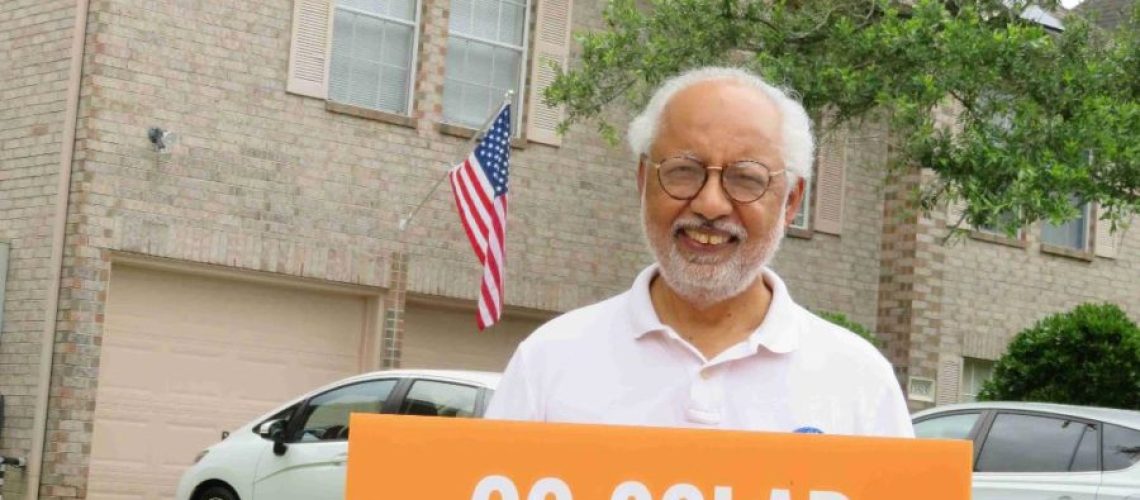Texas solar owners still have to give their energy away at discounted rates
Houston resident Mohammed Nasrullah bought solar panels for his home in 2020. It was a big investment, but he knew that with the free energy he was getting during the day and the excess that he would send back to the grid, he would be able to pay off his system in a relatively short amount of time. That was until his options vanished for earning bill credit at the same rate that he bought electricity from the grid.
This is a problem plaguing solar homeowners and those interested in installing rooftop solar in Texas.
The recently passed Inflation Reduction Act (IRA) will make solar panels more affordable nationwide through tax credits. That’s great. However, it won’t fix the fact that most Texans, like Mohammed, live in the retail choice electricity market, where they can no longer switch to plans that offer them credit on their electricity bill for the extra energy they produce at the same rate that they buy from the grid (aka a “buyback” plan that mimics net metering). The deregulated electricity market is unique to Texas, and it means that anyone who lives in it (more than 85% of the state), must wade through the quagmire of more than 100 Retail Electricity Providers (REPs) offering different rates to select a plan that fits their needs.
Unlike 37 other states, Texas does not have a net metering policy, meaning it’s up to individual utilities to set how much excess rooftop solar generation is worth. Until late last year, solar homeowners had options when switching to a retail plan that mimicked net metering. Then, rising energy generation and transmission costs drove those plans out of the market, forcing many solar owners to give away their excess generation at a discounted rate.
Many Texans go solar to save money on their electricity bills. Without fair and consistent buyback plan options, it’s hard to predict what a payback period will look like – especially for homeowners that want to offset most of their electricity consumption with solar. There are many homeowners, like Mohammed, who already own solar and thought they would have access to one-to-one buyback plans that no longer exist. Many families made hard economic decisions and now have a payback period that has been pushed further out or is completely uncertain.
Record-breaking summer temperatures and skyrocketing electricity prices have made it clear that Texas needs to rethink its electricity grid. This means addressing electricity demand – like energy efficiency, rooftop solar, batteries, and smart thermostats – with the same fervor that’s being given to energy supply (building new power plants and keeping old, inefficient thermal plants online). While rooftop solar can reduce demand, improve congestion by generating energy close to where it’s needed, and decrease the amount of homes drawing energy from the grid when it’s under strain, the pricing signals are out of sync. The IRA will make going solar more affordable for Texans through tax credits, but homeowners will still need to gamble on what their excess generation will be worth in the future.
Unfortunately, Texas politicians have shown little interest in solving this problem. And until plans that fairly credit rooftop solar are offered, whether through policy or in the market, homeowners’ investments will continue to erode. While many people decide to go solar because of a positive experience from a friend or neighbor, the opposite can also be said; homeowners who feel like they have been baited and switched are motivated to dissuade others from falling into the same trap.
So, if Texas politicians won’t fix the problem, who can?
Texas solar homeowners are taking the matter into their own hands and seeking a market solution. Almost 600 Texans in the competitive electricity market have signed a petition organized by my nonprofit, Solar United Neighbors, to say they would switch to a one-to-one plan if properly credited. The group has put out an RFP to providers and aims to review bids and select a plan this fall. By joining together and leveraging their power in numbers, Texas solar homeowners are proving there is large and growing demand for fair plans, and that they can bend the market to work for them.
Despite the coming influx of clean energy investments through the IRA, and widespread bipartisan support of solar, distributed solar in Texas is hampered by buyback plan options that leave homeowners wondering why they switched to solar in the first place. We all deserve the right to produce our energy and be fairly credited for our generation. Until corrective policies or regulations can solidify the value of solar in Texas, we hope to show that there is consumer demand for fair credit and to continue Texas innovation in advanced energy solutions.
Hanna Mitchell is the Texas State Director for Solar United Neighbors.



